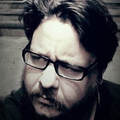|
Continues from: "Inception" is an overview of Robert Craig Baum's next project, The One to Come (a meditation on the final moments of Heidegger's Contributions to Philosophy: Ereignis. On Scenes will publish this work in seven parts across Fall 2017 To mention: These are intended as announcements, part of the introduction. This is not an article. Collisions An exploration of historiography in the National Socialist moment reveals how knowing-awareness within this state may be akin to “nirvana” as those who “know” and those who possess a “knowing awareness” collide. Heidegger offers a challenge to all histories, what can be thought of as actual historical knowing. Heidegger’s “with what” (coinciding/coincidence) establishes a way for the knowing beings to relate to the beings with knowledge (the ones to come). An awareness of the hour of the occurrence of being (history) will lead to a discussion of l’eventenment (Badiou), “event” (Nancy), and “l’aviner” (Derrida). Going Under (1)“Our hour is the epoch of going-under” in an age of dwelling, preparation, and recovery (what remains in the advent of the arrival of the ones to come). For Heidegger, this complex attempt to stay-away, to retreat (from within reticence) is “in all of which the decision of the arrival” of something massive, something or someone or some idea that will, like a gigantic wave, require the life-bearer (ereignis) to go under, avoid the crashing top wave, wallow in the undercurrent of being. OwningAn exploration of ownmost and not ownmost content of the ones to come within a series of pataphorical explorations that seek to articulate Heidegger’s obsession “after the appearance of the gigantic and massive and following the priority of establishment over against that which should fulfill it". Inabiding This chapter is reserved for deeper meditations and philosophical discussion on the state of being in Heidegger known as “going under” in a way that helps to reframe the discussion of Heidegger’s embrace of National Socialism. Suffused with what is coming (what is futural), Heidegger explores the qualities and anxieties of going under (as spell, a wave, to the underworld). The Ones to Come sacrifice themselves to the future living inside a state of ceaselessly exposing themselves to a place which Derrida described as a denial of good forms (no rest, no pause). Why “Heidegger, the Nazi” matters as a discursive practice relates directly to Heidegger’s self-same denial as there is no “the One” there are only “ones to come.” Going Under (2)A revisiting of the qualities of going-under-being: active not passive thinking; unassuming not presumptuous; haptic (Deleuze & Guattari) not optic or separated; frail not powerful (broken not perfected); finite not infinite (e.g., thinking not metaphysics). In his unique way, Heidegger renders ereignis in eschatological terms, a philosophical "sturm und drang" yet apocalyptic without guarantees (no future, no optimism). This chapter takes a detour into Sartre's "Existentialism is a Humanism." Itself (again)Heidegger discloses a kind of thinking that needs to be the open to itself, to open itself, to exceed itself, to transform itself (the thinking with ereignis) into a vessel, a space for metaphysical anxiety, not certitude. Back to Sartre and what I term an "existential rite" this chapter concludes with meditations on the question of Heidegger's existential consecration, this process of radical transformation activated and sustained within the open. Gathering Those who are gathered to go under understand the simplicity of the call as a fostering of that existential stillness the noisy, rapid paced modern technological world simply ruins. Going under enables being to withstand "the utmost fury of the abandonment of being"; and yet somehow this kind of thinking does not qualify as Judeo-Christian. Why? Heidegger refuses to enframe this conversation in "end times" rhetoric or apologetic tones and statements. Instead, he shows how the abandonment of being gives rise to everything else which seeks to repair this relation, suture the tear. The mechanisms of repair are ironically found in technology, politics, art, radio, and television. to be continued... Contributor:  Robert Craig Baum is the author of Itself (Atropos 2011) and Thoughtrave: An Interdimensional Conversation with Lady Gaga (punctum, 2016). He is a philosopher, writer, producer, and philanthropist from Long Island, New York. He lives in Washington DC with his wife and four boys where he just completed his first industry screenplay and remains fast at work on THYSELF (follow-up to 2017 book). https://buffalo8.com/
0 Comments
Leave a Reply. |
Steven Craig Hickman - The Intelligence of Capital: The Collapse of Politics in Contemporary Society
Steven Craig Hickman - Hyperstition: Technorevisionism – Influencing, Modifying and Updating Reality
Archives
April 2020
|

 RSS Feed
RSS Feed
